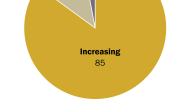Pew Research Center conducted this study to examine the public’s views of the Jan. 6 Capitol riots as well as violent extremism more broadly. For this analysis, we surveyed 12,055 U.S. adults in March 2021. Everyone who took part in this survey is a member of the Center’s American Trends Panel (ATP), an online survey panel that is recruited through national, random sampling of residential addresses. This way nearly all U.S. adults have a chance of selection. The survey is weighted to be representative of the U.S. adult population by gender, race, ethnicity, partisan affiliation, education and other categories. Read more about the ATP’s methodology.
Here are the questions used for the report, along with responses, and its methodology.
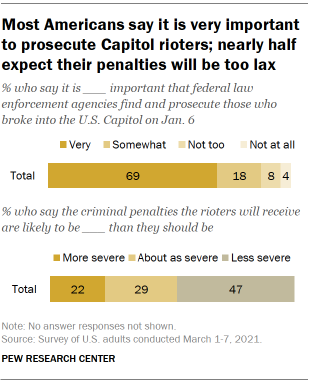
As the FBI and other federal law enforcement agencies continue to pursue charges against participants in the Jan. 6 riot at the U.S. Capitol, the American public generally expresses strong support for continuing these efforts. Yet there are sizable partisan differences in attitudes about the riot at the Capitol, with Democrats far more likely than Republicans to view prosecution of the rioters as very important and to say that penalties for the rioters are likely to be less severe than they should be.
The survey by Pew Research Center, conducted March 1-7, 2021, among 12,055 U.S. adults who are members of the Center’s nationally representative American Trends Panel, finds a wide majority of Americans (69%) saying it is “very important” for federal law enforcement agencies to find and prosecute the people who broke into the U.S. Capitol on Jan. 6. Another 18% say doing this is “somewhat important.” Just 12% say this is not too or not at all important.
Nearly half of Americans (47%) say the criminal penalties that the rioters will receive are likely to be less severe than they should be given what happened, while 22% say the penalties will be more severe than they should be. Only about three-in-ten (29%) expect the punishments will be about right.
The public generally expresses confidence in federal law enforcement agencies to find and prosecute those who broke into the Capitol on Jan. 6. Still, of those who say it is important for these agencies to complete this task, only 20% have a “great deal” of confidence that law enforcement will bring the rioters to justice, while another 48% have a “fair amount” of confidence.
Republicans and Democrats differ sharply over how important it is for law enforcement to prosecute those involved in the Jan. 6 riots and whether criminal penalties will be less severe than deserved. Partisans are less divided over whether federal law enforcement agencies are up to the task of finding and prosecuting participants who scattered across the country after the events that day.
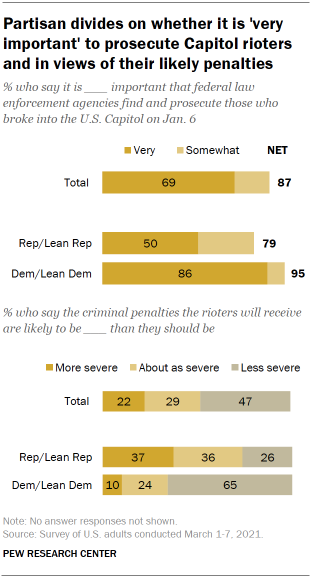
While large majorities in both parties (95% of Democrats and 79% of Republicans, including those who lean to each party) say it is at least somewhat important that federal law enforcement agencies find and prosecute those responsible for the Jan. 6 riot, Democrats are more intense in their views: Fully 86% of Democrats and independents who lean toward the Democratic Party say finding and prosecuting rioters is very important, compared with half of Republicans and Republican leaners.
Similarly, nearly two-thirds of Democrats (65%) say it is likely that the criminal penalties the rioters receive will be less severe than they should be. Republicans are divided: 37% say they are likely to be more severe than they should be, while 26% expect them to be less severe.
Additionally, Democrats express slightly higher confidence in federal law enforcement to find and prosecute those responsible for what happened at the U.S. Capitol in January. Among Democrats who said it was at least somewhat important to find and prosecute those responsible for the Capitol riots, about seven-in-ten Democrats (71%) say they have a great deal (23%) or fair amount (48%) of confidence in federal law enforcement to do so, compared with 66% of Republicans (18% a great deal and 49% a fair amount).
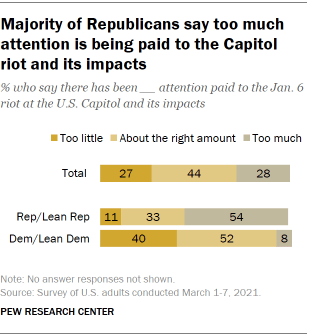
While a plurality of Americans (44%) say the Jan. 6 riot at the U.S. Capitol and its impacts have been getting about the right amount of attention overall, there also are significant differences in these views among Republicans and Democrats.
Many Republicans say the Jan. 6 riots and their aftermath have been getting too much attention (54% say this), which is not a widely shared view among Democrats (8% say too much). By contrast, 40% of Democrats say the riot has been getting too little attention; just 11% of Republicans say the same. About half of Democrats (52%) and a third of Republicans say the riots have gotten about the right amount of attention.
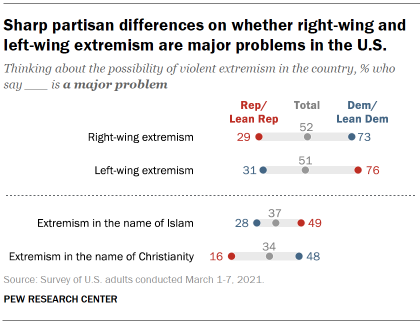
The survey finds that the public expresses more concern about right-wing and left-wing extremism stirring possible violence in the country than either Islamic or Christian extremism. About half of U.S. adults say right-wing extremism (52%) and left-wing extremism (51%) are major problems in the country. Fewer than four-in-ten say violent extremism in the name of Islam (37%) or in the name of Christianity (34%) is a major problem.
Republicans and Democrats are widely divided over which political wing represents the greater threat. About three-quarters of Democrats and Democratic-leaning independents (73%) say right-wing extremism is a major problem, while a similar share of Republicans and Republican leaners (76%) say the same about left-wing extremism. Only about three-in-ten Democrats (31%) say left-wing extremism is a major problem, and 29% of Republicans say this about right-wing extremism.
In addition, Republicans (49%) are more likely than Democrats (28%) to say extremism in the name of Islam is a major problem. The reverse is the case for extremism in the name of Christianity: 48% of Democrats say it is a major problem, versus 16% of Republicans.
Reactions to aftermath of the Jan. 6 Capitol riot
Amid continued investigations and congressional hearings into the riots that occurred at the U.S. Capitol on Jan. 6, nearly three-in-ten adults (27%) say there has been too little attention paid to the riots and their impacts. A similar share (28%) says there has been too much attention paid to the events at the Capitol, while a 44% plurality says the riots have received about the right amount of attention.
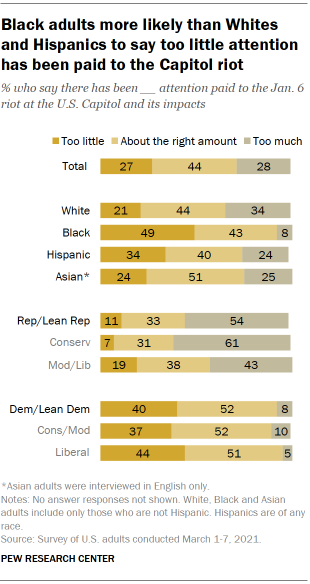
There are differences in these views by race, partisanship and ideology. Among White adults, 44% say about the right amount of attention has been given to the aftermath of the Capitol riots. Roughly a third (34%) say too much focus has been given to the riots, while a smaller share (21%) says too little attention has been paid.
In contrast, Black adults are significantly more likely to say there has been too little attention paid to the riots and its aftermath: 49% of Black adults say there’s been too little, while just 8% say there has been too much focus on the riot.
This racial divide in attitudes is also evident among Democrats and Democratic-leaning adults. While a majority of White Democrats say there has been the right amount of attention paid to the aftermath of the riots (58%), a smaller share of Black Democrats says the same (43%). In fact, more Black Democrats say there has been too little attention given to the riots (50% of Black Democrats vs. 37% of White Democrats).
A majority of Republicans and Republican leaners say there has been too much attention paid to the riot and its impacts (54%). Republicans, unlike Democrats, are divided along ideological lines: 61% of conservative Republicans say the riot and its aftermath have received too much attention, compared with 43% of moderate and liberal Republicans.
Pluralities of Democrats across the ideological spectrum say there has been about the right amount of focus on the Capitol riots and its impacts.
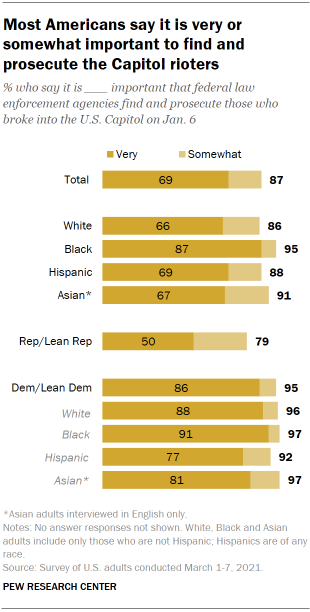
While there is broad consensus across demographic groups that it is at least somewhat important for federal law enforcement to find and prosecute those who broke into the U.S. Capitol on Jan. 6, there is some variation in the degree to which these groups say it is a priority. And while majorities say they have confidence in federal law enforcement agencies to locate and prosecute those involved, relatively small shares express a great deal of confidence that they can do this.
Overall, about eight-in-ten or more adults across demographic groups say it is at least somewhat important for federal law enforcement agencies to seek out those responsible for the Capitol breach (87% overall).
There are racial, ethnic and partisan differences in these views. Black adults are particularly likely to say it is very important for federal law enforcement to penalize those involved (87%); smaller shares of White (66%), Hispanic (69%) and Asian adults (67%) say the same.
There also is a large gap between Republicans and Democrats on the importance of finding and prosecuting those involved in the riots. Just 50% of Republicans say it is very important to find and prosecute those responsible. In contrast, 86% of Democrats say the same.
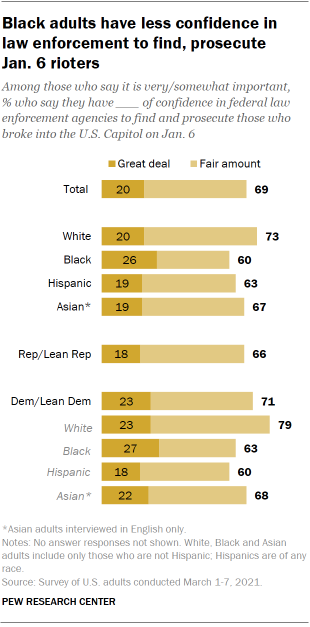
Among adults who say that finding and prosecuting those who broke into the U.S. Capitol on Jan. 6 is at least somewhat important, 69% also express at least a fair amount of confidence in federal law enforcement to find and prosecute those responsible for the Capitol breach. Relatively small shares of these adults express a great deal of confidence (20% overall).
Among White adults who view prosecution as important, for example, about seven-in-ten express confidence in federal law enforcement agencies to identify and penalize those involved. But while Black adults are among the most likely to say this is important, they are among the least likely to express confidence in federal law enforcement to do this (60%).
This pattern also holds true among Democrats and Democratic leaners who say it is important to prosecute those who broke into the . Nearly eight-in-ten White Democrats (79%) express confidence in federal law enforcement to bring the Capitol rioters to justice, while just 63% of Black Democrats say the same.
Looking back at Trump’s impeachment and acquittal
About a month after former President Donald Trump was acquitted in his second impeachment trial in the Senate, which focused on his conduct leading up to the U.S. Capitol riot, just over half of Americans (52%) say Trump’s conduct was wrong, and he should have been convicted by the Senate. About three-in-ten say his conduct was not wrong, and he should not have been impeached, while 15% say his conduct was wrong, but he should not have been convicted by the Senate.
Just as Republicans and Democrats were at odds over whether Trump was responsible for the rioting at the Capitol in early January, partisans view the results of the impeachment trial in very different ways.
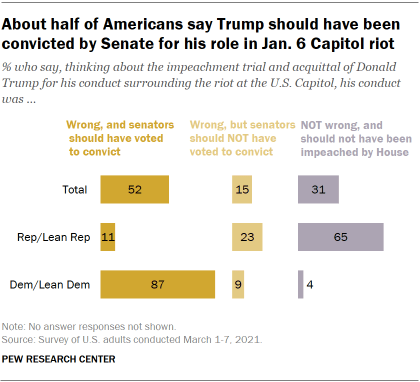
Nearly two-thirds of Republicans and GOP leaners (65%) say Trump’s conduct was not wrong and he should not have been impeached by the House of Representatives. Nearly a quarter (23%) say his conduct was wrong, but senators should not have voted to convict him. And only 11% of Republicans say that his conduct was wrong, and he should have been convicted by the Senate.
In stark contrast, an overwhelming majority of Democrats and Democratic leaners (87%) say Trump’s conduct was wrong, and the Senate should have voted to convict him. Just 9% say his conduct was wrong but he should not have been convicted; another 4% say his conduct was not wrong.
Though Republicans and Democrats express opposing views about several aspects of the rioting that occurred at the U.S. Capitol on Jan. 6, there are stark divisions among Republicans on these issues. Republicans who in January expressed the view that Trump was the rightful winner of the 2020 presidential election are much more likely than those who say Biden won the 2020 election to view the riot as overblown and Trump’s impeachment as unjustified.
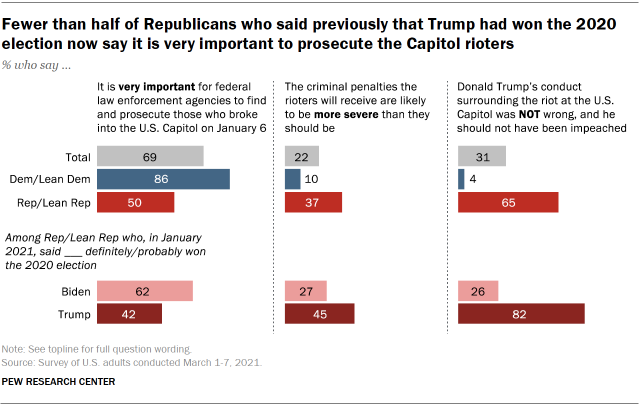
In January 2021, when asked which candidate won the 2020 presidential election, 64% of Republicans and Republican leaners said that Trump definitely (33%) or probably (31%) received the most votes cast by eligible voters in enough states to win the presidential election. Only about a third (34%) said correctly that Biden was the rightful winner.
Republicans who said Trump definitely or probably won the election earlier this year are nearly twice as likely as Republicans who said Biden definitely or probably won to now say the riots at the Capitol have received too much attention (66% of Republicans who say Trump won vs. 35% of Republicans who say Biden won). Similarly, while 62% of Republicans who said Biden won now say that it is very important that federal law enforcement agencies find and prosecute those who broke into the U.S. Capitol on Jan. 6, fewer than half of Republicans who said Trump won now say prosecution is very important.
This pattern is also evident in views of the punishments that rioters are likely to receive. Republicans who said Biden won in the prior survey are now significantly less likely than Republicans who said Trump won to think the criminal penalties that rioters will receive are likely to be more severe than they should be (27% vs. 45%, respectively).
One of the largest gaps that divides Republicans who said Trump won and Republicans who said Biden won is on views of Trump’s impeachment as a result of his conduct leading up to events on Jan. 6: Fully 82% of Republicans who said Trump won the election say his conduct was not wrong, and that the House should not have voted to impeach him. This compares with just 26% of Republicans who said Biden won the 2020 election.
Views of violent extremism
When it comes to the possibility of violent extremism in the country, Americans are more likely to say political extremism represents a greater problem than other forms of extremism inspired by religion.
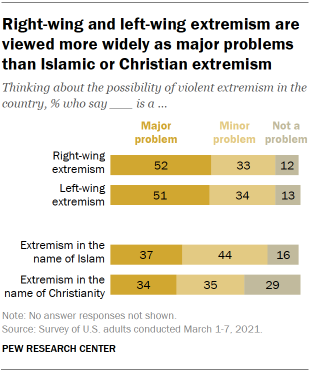
About half of the public says right-wing extremism is a major problem (52%), another third say it is a minor problem and 12% say it is not a problem. The public’s overall views of left-wing extremism are similar: 51% say it is a major problem, 34% say minor problem and 13% say not a problem.
The shares saying extremism inspired by Islam or Christianity are major problems are far lower. Slightly fewer than four-in-ten adults (37%) say extremism inspired by Islam is a major problem, while 44% say it is a minor problem and 16% say it is not a problem. About a third of Americans (34%) say extremism in the name of Christianity is a major problem, with 35% saying it is a minor problem and 29% say it is not a problem.
While far more Republicans view left-wing extremism as a major problem than right-wing extremism – and the opposite is true among Democrats – large majorities in both parties say right-wing and left-wing extremism are major or minor problems.
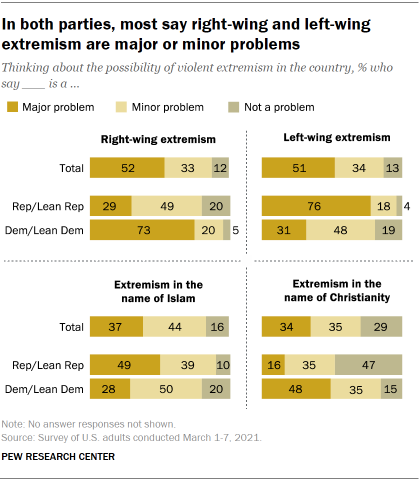
Among Republicans and Republican-leaning independents, only about three-in-ten (29%) say violent right-wing extremism is a major problem for the country, but about half (49%) say it is a minor problem. Just two-in-ten say it is not a problem.
Views among Democrats and Democratic leaners of left-wing extremism follow a similar pattern: About three-in-ten (31%) say left-wing extremist violence is a major problem, about half say it is a minor problem (48%) and just 19% say it is not a problem.
Both Republicans and Democrats broadly acknowledge that violent extremism inspired by Islam is at least a minor problem in the country (88% of Republicans and 78% of Democrats say this). However, Republicans are more likely than Democrats to view Islamic extremism as a major problem (49% of Republicans vs. 28% of Democrats).
They also differ on whether extremism inspired by Christianity is a problem for the country: 83% of Democrats say Christian extremism is at least a minor problem (including 48% saying it is a major problem), yet only about half of Republicans (51%) say it is at least a minor problem (with just 16% saying major problem). Nearly half of Republicans (47%) say extremism in the name of Christianity is not a problem in the country today.

In both parties, there are ideological differences in attitudes about the threat posed by violent extremism. For example, a larger share of liberal Democrats (83%) than conservative and moderate Democrats (66%) say right-wing extremism is a major problem. By contrast, conservative Republicans are more likely than moderate and liberal Republicans to say that left-wing extremism is a major problem.
Moderates and liberals in the GOP also are more likely than conservative Republicans to see right-wing extremism (39% to 23%) as a major problem. And conservative and moderate Democrats similarly diverge from liberals in their party in views of left-wing extremism (41% of conservative and moderate Democrats say major problem vs. 18% of liberals).
There are similar patterns across ideological groups in their views of religious extremism – though the differences are generally smaller. Fewer moderate and liberal Republicans than conservative Republicans say extremism in the name of Islam is a major problem (42% vs. 53%) and more say extremism inspired by Christianity is a major problem (23% vs. 12%). The patterns are similar but reversed among Democrats: Fewer conservative and moderate Democrats than liberal Democrats say Christian extremists are a major problem (38% vs. 59%), but more moderate and liberal Democrats say Islamic extremists are a major problem (34% vs. 21%).
Knowledge of QAnon and views of its supporters
A majority of Americans (61%) report knowing at least something about the QAnon conspiracy theories, while about four-in-ten (39%) say they know “nothing at all” about them. Few U.S. adults say they know “a lot” (3%), while 29% say they know “some” and the same share say they know “not much.”
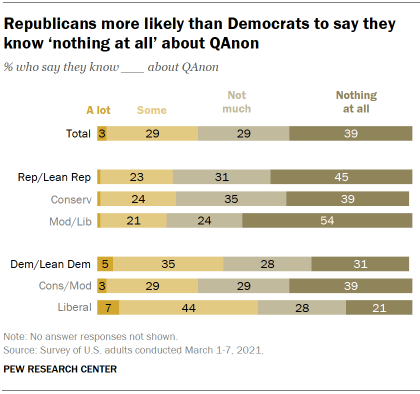
Democrats and independents who lean toward the Democratic Party (68%) are more likely than Republicans and Republican leaners (54%) to say they know something about the QAnon conspiracy theories. Nearly half of Republicans (45%) say they know nothing at all about them; about three-in-ten Democrats (31%) say the same.
Liberal Democrats report the highest levels of knowledge about QAnon. Half of liberal Democrats know a lot (7%) or some (44%) about it, and another 28% say they know not much. The next most knowledgeable groups are conservative and moderate Democrats (61% know something, including 32% who know some or a lot) and conservative Republicans (60% know something, including 25% some or a lot). The least knowledgeable partisans are Republicans with moderate or liberal political views – among this group, a majority say they know nothing at all about these conspiracy theories (54%) and fewer than a quarter know a lot or some (22%).
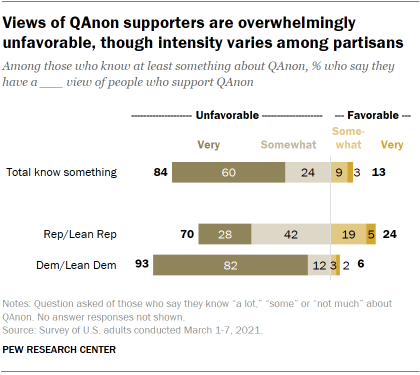
Few Americans who know at least something about QAnon have favorable views of people who support the conspiracy theories. Just 13% of those who know about QAnon have favorable views of its supporters, while 84% have unfavorable views (including 60% whose views are very unfavorable).
Those who say their views of QAnon supporters are favorable are concentrated among Republicans and Republican-leaning independents. About a quarter of Republicans who know about QAnon say they view its supporters favorably (24%) – though just 5% say their views are very favorable, compared with 19% who say somewhat favorable. Fewer than one-in-ten Democrats and Democratic leaners (6%) have favorable views of QAnon supporters.
Most Republicans and Democrats say they view people who support these conspiracy theories unfavorably, though Democrats are harsher in their judgments. Fully 82% of Democrats who know about QAnon say they have very unfavorable views of supporters, versus 28% Republicans who share this view. About four-in-ten Republicans who know about QAnon (42%) have somewhat unfavorable views of QAnon supporters; 12% of Democrats say the same.
